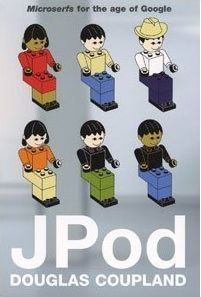Another day, another newly-coined paradigm label for the unnamed (or rather polymonikered) present: this is expostmodernism [via Justin Pickard].
The force most people want to talk about is social media and wireless devices, and they are often treated as the only causes of the culture shift happening right now. But that’s a very narrow view. I see a number of major factors driving ExPoMod, including:
- A new boogieman. The Cold War ended in the 90s. Nuclear attacks still pose a risk, but are unlikely to wipe out entire continents. Terror attacks are the new spook, and while devastating, they tend to be localized. When the world is not in danger of ending, there is less motivation for cynicism and apathy.
- The maturing of the internet. In the early 90s, the savviest internet users were teens. The internet was a place of dubious information and anonymity. In the Oughts those users grew up and harnessed the internet professionally. Now people use their real names and information is as accurate (or more accurate) as offline sources.
- The depreciation of privacy. Throughout the postmodern period there was a concern for privacy of personal information. Only government and corporations had the resources to collect and use repositories of personal information, and they weren’t trusted. Since the late 90s there has been increasing value to putting one’s personal information online, and increasing difficulty in keeping it private. With real advantages to sharing personal information, privacy has become a polarized issue and more people are comfortable giving it up.
- A new type of war. The wars of the last 20 years tend to kill thousands or tens of thousands of people, a sharp contrast to the millions of dead in the World Wars, Korea, and Vietnam. Nationalism is less polarized, and discussion of war is more openly couched in economic terms.
- Economic shift. As the housing market fails, people find less security in staying in one location. More people take advantage of the ease of travel and communication, and they spend money differently. Sectors that delivery creativity, information, technology, and experiences are seeing growth.
- Change in education. As the price of college soars and more jobs require Master’s degrees, people increasingly seek ways to self-employ or work creatively. Many people prefer focused training through workshops, conferences and online materials to be preferable to formal institutions of higher learning. With the breadth and depth of information available online, this strategy has become a viable alternative to college for launching a successful career.
Together these factors shape a multi-generational move toward new beliefs, views and lifestyles. The single most notable shift is the decline of alienation. Alienation, the banner trait of postmodernism, occurs when an individual feels their existence has no point—either because their work provides no satisfaction, or because they don’t feel like they fit in with their community.
Not sure how much newness is in that pseudomanifesto, or that I agree with everything it says, and I definitely think “altermodern” has a better ring to it… but the sense that we’re on the cusp of a transition? Yeah, I get that. Hard to look at the news and not get that, really.


 JPod by Douglas Coupland
JPod by Douglas Coupland